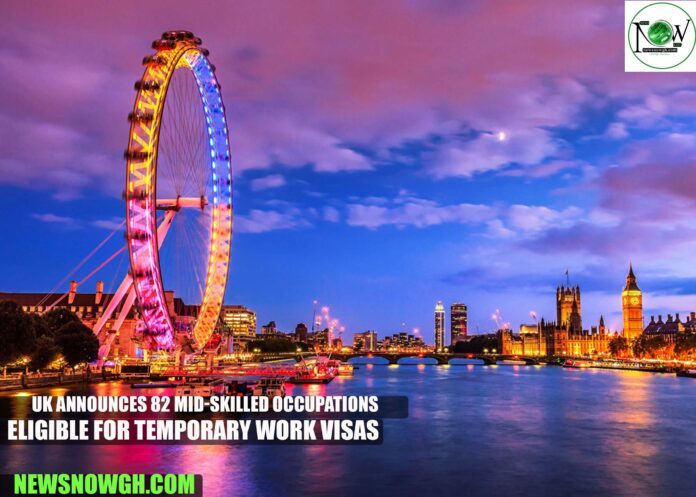UK Announces 82 Mid-Skilled Occupations Eligible for Temporary Work Visas
The UK government has identified 82 mid-skilled occupations eligible for a new Temporary Shortage List (TSL), opening doors for limited work visas. This initiative focuses on vital roles in industry and infrastructure as part of wider immigration reforms set for 2026.
On October 9, 2025, the Migration Advisory Committee (MAC) released the first of two reports detailing this new visa system. This report highlights occupations that could qualify for temporary work visas. Let’s explore this development, its significance, and what to anticipate moving forward.
Overview: Temporary Work Visa
A temporary work visa allows foreign citizens to live and work in the UK for a specified time. This visa is designed to address urgent labor shortages in specific sectors. Unlike permanent visas, temporary work visas are time-limited and align with designated roles experiencing significant demand.
Temporary Shortage List (TSL)?
The TSL serves as a selective entry point for mid-skilled jobs (RQF levels 3 to 5) in the UK. It grants access to work visas for occupations considered essential to the UK’s industrial or infrastructural needs.
Previously, only roles at RQF level 6 (degree level) and higher qualified for the primary Skilled Worker route. The TSL aims to provide a limited exception for critical positions outside this range, but only under strict guidelines. Importantly, being on the current list does not guarantee a spot on the final TSL.
Stage 1: Creating the Shortlist
During Stage 1, the MAC evaluated several criteria to identify occupations vital for implementing the Industrial Strategy and enhancing infrastructure. They selected 82 jobs at RQF levels 3 to 5 for further assessment in Stage 2.
This next phase will determine if these roles genuinely face shortages, whether migration is a viable solution, and if the respective sectors have robust “Jobs Plans” to prioritize UK workers.
Full List of 82 Mid-Skilled Occupations
The MAC has put forward the following occupations for potential inclusion in the new TSL:
- Managers in logistics
- Laboratory technicians
- Engineering technicians
- Medical and dental technicians
- IT operations technicians
- Artists, authors, and translators
- Financial and accounting technicians
- Skilled trades like plumbers and electricians
- Construction professionals like bricklayers and carpenters
- Energy and water plant operatives
This list reflects a range of sectors, from technical roles to creative professions, highlighting the diverse needs of the UK labor market.
Implications for Employers and Migrant Workers
For Employers
Companies relying on mid-skilled workers must adapt to these changes, as they could significantly impact their ability to recruit foreign talent. Engaging in the Call for Evidence is crucial; strong Jobs Plans are necessary to avoid exclusion from the TSL. Employers should also prepare for increased costs and stricter regulations regarding salaries and dependents.
For Migrant Workers
If your occupation is among the 82 listed, you remain eligible for a temporary visa route. However, these visas are not designed for permanent residency, and dependent family members are currently not permitted for new entrants in RQF 3–5 roles. Visa durations could range from three to five years, after which a switch to a different visa class may be necessary.
For the UK
The TSL marks a shift in the intersection of migration policy and industrial strategy. This approach aims to make immigration a proactive tool for economic growth while encouraging sectors to invest in domestic skills. However, balancing these interests poses a challenge: a too restrictive policy could stifle growth, while a too lenient policy might undermine the goal of reducing net migration.
What’s Next?
The MAC is preparing to launch a Call for Evidence for Stage 2, inviting input from employers and stakeholders on the validity of these roles for TSL inclusion. The aim is to ensure that temporary migration complements domestic workforce development.
For those eyeing opportunities in the UK, the final TSL in mid-2026 promises to be a pivotal policy shift to watch closely.
Follow NewsNowGh to stay updated on the latest information regarding work permits, visas, and visa-sponsored employment.


